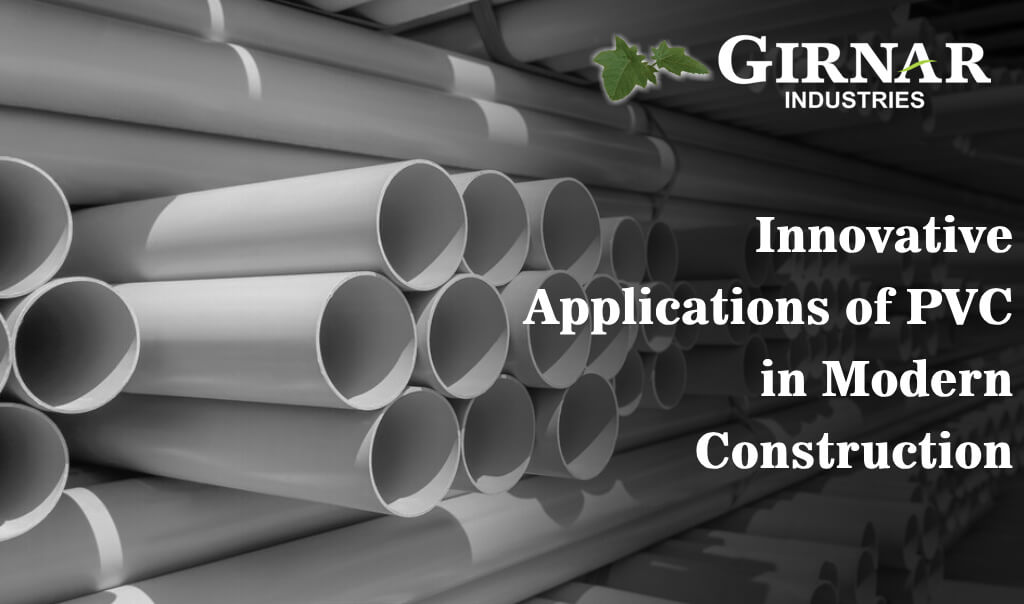Materials are essential in the fast-paced building world because they shape new ideas. Most people know this material as Polyvinyl Chloride (PVC). It has become trendy in modern buildings. PVC pipes are used only for plumbing, but they have grown beyond their original purpose and are now used in various creative ways in the building. This blog post will discuss the innovative ways PVC is used in modern facilities, showing how flexible, long-lasting, and sustainable it is.
PVC Pipes as Structural Components
One of the most creative ways PVC is utilized in today’s construction is as a structural element. Engineers and architects are using PVC pipes’ strength and flexibility more and more to make structures that are both light and strong. Plastic (PVC) is excellent for building things in places where things can rust, like coastal areas, because it doesn’t rust and is easy to work with.
When it comes to building facades, for example, builders have successfully used PVC pipes as both decorative elements and load-bearing parts. This unusual use of PVC not only gives the building a unique look but also makes it lighter, which makes it a sustainable and cost-effective choice.
PVC in Green Building Initiatives
Plastics like PVC are very important to the change in the construction business towards more eco-friendly and long-lasting methods. PVC pipes are at the head of green building efforts because they can be recycled and are made in ways that use little energy.
Innovative designs use PVC pipes in rainwater collection and greywater recycling systems. It is better for the environment and saves energy because these systems use less water from primary sources. Furthermore, the durability of PVC pipes ensures the longevity of these eco-friendly systems, making them an essential part of building environmentally conscious buildings.
For More Blog:- pvc pipe usage, POLYPROPELENE
PVC for Smart Infrastructure
In this age of “smart cities,” building infrastructure needs new and creative ideas. Because they are flexible and work with current technologies, PVC pipes are becoming essential in building smart infrastructure.
PVC pipes are used to set up smart lighting systems, control traffic, and even sensor networks that are buried underground. PVC is safe for use in electrical uses because it is not conductive. This makes sure that smart infrastructure works well. As more towns go digital, PVC plays a more significant part in making cities more connected and efficient.
PVC in Modular Construction
Modular construction is growing more common because it saves time and money and is better for the planet. In this field as well, PVC pipes are making their mark by helping to create modular buildings that are easy to put together and take apart.
Modular framing systems are held together by PVC pipes, which make the framework light but strong. Plastic pipes are convenient for off-site construction jobs because they are easy to move and set up. Pop-up event buildings and temporary housing are made of Polyvinyl which is a useful material in modular construction.
PVC Pipes in Geothermal Heating Systems
Geothermal systems are being used more and more in new buildings because more people want sustainable ways to heat their homes. Using PVC lines is very important for these systems because they are long-lasting and don’t rust, which keeps the geothermal fluids moving.
Geothermal heating systems can be used in a lot of different places because PVC lines are flexible and can be easily installed in a variety of terrains. Not only does this creative use of PVC save energy, but it also fits in with the worldwide push for green energy sources.
Conclusion
Innovative uses of PVC in modern construction, especially in the form of PVC pipes, have changed the industry by delivering sustainable, cost-effective, and diverse solutions. PVC has shown itself as a material that exceeds traditional expectations in everything from structural components to green building efforts and smart infrastructure.
FAQ’S
What is the commercial use of PVC?
The commercial use of PVC (Polyvinyl Chloride) in modern construction is extensive. PVC is widely employed for pipes, electrical insulation, and roofing membranes due to its durability, corrosion resistance, and cost-effectiveness. It's a key material in window frames, flooring, and wall coverings. Additionally, PVC's versatility extends to signage, cable insulation, and inflatable structures.
Why are PVC pipes preferred nowadays?
PVC pipes are preferred in modern construction for several reasons. Their lightweight nature, corrosion resistance, and durability make them easy to handle and long-lasting. PVC pipes also offer cost-effectiveness compared to traditional materials. Their smooth interior surface ensures efficient water flow and minimizes clogs. Moreover, PVC is resistant to chemical and biological degradation, ensuring the pipes maintain their integrity over time.
What is PVC used for in electronics?
In electronics, PVC (Polyvinyl Chloride) serves various crucial purposes. It is commonly used as insulation for electrical cables due to its excellent electrical insulating properties. PVC's flexibility and resistance to moisture and chemicals make it an ideal choice for cable sheathing, protecting wires from environmental factors. Additionally, PVC is used in the production of cable jackets and wire harnesses.
Which pipe is good PVC or UPVC?
Choosing between PVC (Polyvinyl Chloride) and UPVC (Unplasticized Polyvinyl Chloride) depends on specific construction needs. PVC is flexible and commonly used for non-pressure applications, while UPVC, being rigid, excels in pressurized systems like water supply. UPVC offers enhanced strength, chemical resistance, and durability, making it suitable for diverse conditions. Both have distinct advantages, with PVC being versatile, and UPVC excelling in demanding environments.
Which pipe is best for plumbing?
The choice of the best pipe for plumbing depends on specific needs. PVC (Polyvinyl Chloride) pipes are popular for non-pressure applications due to their versatility, cost-effectiveness, and ease of installation. CPVC (Chlorinated Polyvinyl Chloride) pipes are suitable for hot water systems, offering enhanced temperature resistance. PEX (Cross-linked Polyethylene) pipes are flexible, corrosion-resistant, and ideal for water supply lines.


